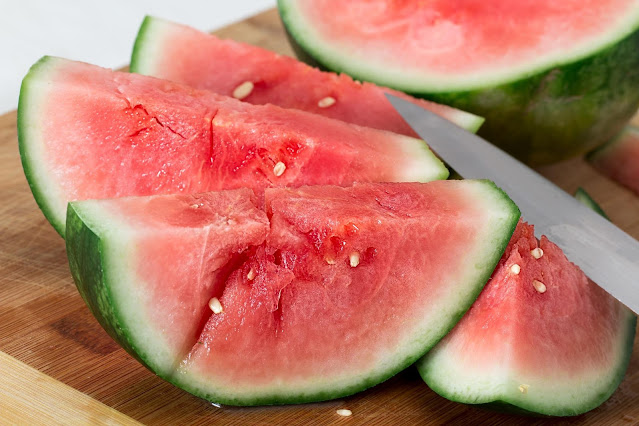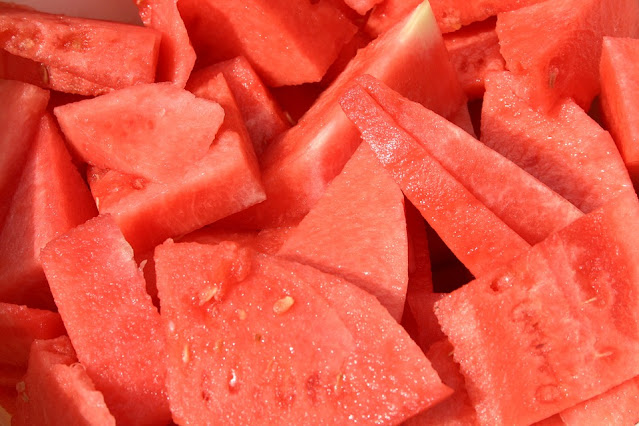5 Reasons to Eat Watermelon When You're Pregnant
If you’re pregnant and craving something sweet, watermelon is the ideal choice to satisfy your sweet tooth, with only 85 calories per cup! But watermelon isn’t just sweet and delicious – it’s also good for you and your growing baby. Watermelon has tons of vitamins and minerals, including vitamins A, C, and B6; copper; potassium; lycopene; selenium; magnesium; and zinc. The high water content of watermelon makes it hydrating and can help prevent leg cramps that pregnant women may experience during their third trimester.
1) As A Sweet Treat
Watermelon is a delicious and refreshing
summer treat—but it's also a nutrition powerhouse. Watermelons are filled with
vitamins A, B6, C and E; as well as essential minerals like magnesium, iron and
calcium. Though watermelons don't offer any specific nutrients that may be
beneficial for pregnant women in particular, they are low in calories (about 90
per cup) and high in fiber, which makes them a great way to keep your energy up
without adding extra calories. And because watermelons are so juicy, you'll
drink more during eating—which can help prevent dehydration during pregnancy.
2) Helps With Morning Sickness
The first trimester of pregnancy can be
rough. The nausea, exhaustion, and food aversions associated with pregnancy can
make you wish you'd never agreed to conceive in the first place. But watermelon
offers some relief. Just one cup of watermelon has only 58 calories and is
jam-packed with vitamin C (which helps ward off common colds), B6 (which keeps
your skin looking good), and lycopene (which reduces your risk of heart
disease). Even if you don't love watermelon, it's worth eating a few cups just
for these nutrients!
3) Provides Vitamins & Minerals
Moms-to-be may get enough folic acid and other important vitamins and minerals from prenatal supplements, but it's always a good idea to eat a wide variety of fruits and vegetables. That's because many fruits and veggies contain plenty of vitamins and minerals that aren't included in prenatal supplements.
R E A D M O R E
For example, watermelon contains
vitamin C, which is known for its ability to help heal wounds or even reduce
arthritis pain. A serving of one cup (144 grams) of watermelon will give you 3%
of your daily vitamin C needs. It also provides small amounts of potassium, iron,
magnesium, phosphorus and zinc—all essential minerals required by your growing
baby! And let's not forget about lycopene: Watermelons have 20 times more
lycopene than raw tomatoes!
4) Lowers Cholesterol
Yes, doctors have been saying it for
years, but now there’s even more evidence that fruit and vegetable consumption
is tied to lower blood cholesterol levels. The bioflavonoids in watermelon help
lower LDL (bad) cholesterol and triglycerides and regulate HDL (good)
cholesterol. It also helps maintain a healthy body weight by helping you feel
full faster. This means you are less likely to eat processed or junk food as
your pregnancy progresses—which can be a big boon when your hormones are going
haywire! As an added bonus, since watermelons help with hunger pangs, they may
actually make it easier for you to get enough of your daily recommended intake
of fruits and vegetables.
5) It's Low In Calories
With fewer than 50 calories per cup,
watermelon is a great choice for dieters. There are tons of other low-calorie
fruits and vegetables out there, but it's hard to beat how satisfying it is
without piling on tons of cals. In fact, studies show that eating watermelon
can help people lose weight even if they don't cut back on calories elsewhere
in their diet. And because it's full of water and fiber, you'll feel fuller
longer—which can ultimately result in eating less throughout your day. Plus,
while many people assume fruit is always a healthier alternative to sweets or
snacks, an 8-ounce glass of orange juice packs 200 calories!






